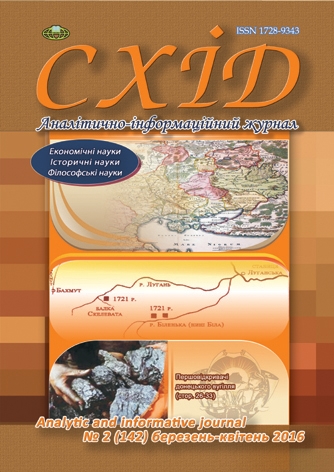The system of social responsibility of the society
DOI:
https://doi.org/10.21847/1728-9343.2016.2(142).70601Keywords:
essential sign of social being, social responsibility, social principle, social law, social normAbstract
The author's concept of social responsibility locates in article as essential sign of social being. Social responsibility appears as a dialectical unity of opposites - the freedom and necessity, the degree of freedom and the need to measure, which must comply with the requirements of all subjects of public relations, as the requirements of the law (measures is the law). Responsible communications and dependences, as the general factor of social self-organization, creates society structure on a vertical (society - a social community - the personality) and across (ecology, economy, policy, the right, morals, an esthetics, religion). As the general social integrator of social being social responsibility can be identified as the general social principle. The principle of social responsibility, subsystem (ecological, political and others) the principles, laws and norms represent dialectic unity general, special and single.
The article substantiates the idea that the growth of social responsibility is an basic law of the sociology. For this, he presents the history of mankind as an evolutionary change in forms of social responsibility.
References
On Amendments to the Constitution ofUkraine. Law of Ukraine № 2222-1V on December 8, 2004, available at: http://zakon0.rada.gov.ua/laws/show/2222-15 (ukr).
Andreev Yu. P. (1985), Content and structure of public relations, Publishing House of Saratov University Press, Saratov, 171 p. (rus).
Afanasiev V. G. (1980), System and Society, Politizdat, Moscow, 368 p. (rus).
Bell D. (1999), The coming post-industrial society: social forecasting experience, Academy Publishing, Moscow, 949 p. (rus).
Drucker Peter (2007), Management Tasks XXI century, Williams Ltd, Moscow, 272 p. (rus).
Parnyuk M. A., Lazarenko B. P., Prichepy Ye. N. and other (1987), Categories «law» and «chaos», Naukova Dumka, Kyiv, 294 p. (rus).
Kutsenko V. I. (1972), Social problems as a category of historical materialism, Naukova Dumka, Kyiv, 371 p. (rus).
North Douglas (1997), Institutions, Institutional Change and Economic Performance, available at: http: //gtmarket.ru/laboratory/basis/6310/ (rus).
Plakhotny A. F. (1981), The problem of social responsibility, Vyshcha Schkola, Kharkiv, 192 p. (rus).
Ritzer George (2002), Modern sociological theory, Piter Publishing, Sankt-Petersburg, 688 p. (rus).
Ruchka A. A. (1976), Social values and norms, Naukova Dumka, Kyiv, 152 p. (rus).
Svidersky V. I., Zobov R. A. (1979), Ratio as a category of materialist dialectics, Voprosy filosofii, № 1, pp. 88-95 (rus).
Toffler Alvin (1999), Third Wave, Izdatelstvo AST, Moscow, 261 p. (rus).
Touraine Alain (1998), Return of a man of action. Essay Sociology, Science World Publishing, Moscow, 204 p. (rus).
Ouledov A. K. (1975), Sociological laws, Znaniye, Moscow, 295 p. (rus).
Ouledov A. K., Popov V. D. (1979), Sociological laws, knowledge and management, Znaniye, Moscow, 64 p. (rus).
Friedman M. (2006), Capitalism and Freedom, New Publishing House, Moscow, 240 p. (rus).
Shybko O. I. (2013), Ecological imperative in the system of public social responsibility, Skhid, № 2 (122), pp. 129-133 (ukr).
Shybko O. I. (2012), The growth of social responsibility as an objective law of civilized progress, Skhid, № 5 (119), pp. 150-153 (ukr).
Shybko O. I. (2011), The rules in the social responsibility, Skhid, № 5 (112), pp. 136-139 (ukr).
Shybko O. I. (2011), The essence of the Ukrainian national idea, Skhid, № 4 (111), p. 145-149 (ukr).
Downloads
Published
How to Cite
Issue
Section
License
Copyright (c) 2016 Oleksandr Shybko

This work is licensed under a Creative Commons Attribution-NonCommercial-NoDerivatives 4.0 International License.
1. Authors bear responsibility for the accuracy of facts, quotations, numbers and names used.
2. Manuscripts are not sent back.
3. The publisher does not always agree with the authors' opinion.
4. The authors reserve the right to authorship of the work and pass the first publication right of this work to the journal under the terms of a Creative Commons Attribution Non-Commercial License, which allows others to freely distribute the published research with the obligatory reference to the authors of the original work and the first publication of the work in this journal.
5. The authors have the right to conclude separate supplement agreements that relate to non-exclusive work distribution in the form in which it has been published by the journal (for example, to upload the work to the online storage of the journal or publish it as part of a monograph), provided that the reference to the first publication of the work in this journal is included.

